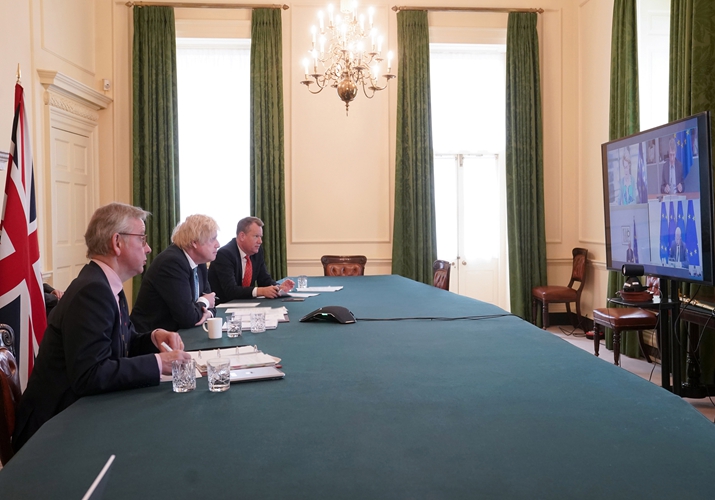| Voice |
| Brexit: a clumsy English attempt to have their cake and eat it too | |
|
|
 British Prime Minister Boris Johnson (center) holds a meeting with EU officials on Brexit issues by video link from London on June 15(XINHUA)
Since the British voted to leave the EU in the summer of 2016, it was clear that something that seemed to be simple in theory was to be difficult in practice.
After suffering several parliamentary defeats during her time at 10 Downing Street, Theresa May's exit deal attempts received a final blow when she was ultimately forced to leave office in disgrace last year.
Although May's successor, Boris Johnson, somehow managed to secure a withdrawal agreement with the EU in October 2019 where the two sides gave each other an 11-month transition period to strike new agreements on crucial points before the end of December 31, 2020, the last few months were definitely not an easy ride for him either.
With plenty of theatrics on both sides, an emergency attempt to close this peculiar chapter in West European history recently came from Brussels, sending Michel Barnier, EU Brexit chief negotiator, to London in order to come to an agreement with Westminster.
The motive behind this move was an aim to strike a last-minute free trade agreement and avoid a no-deal Brexit, which would put tariffs on goods and create further chaos which is predicted to be even greater due to the second wave of the pandemic.
Barnier extended his visit in the UK until October 28 aiming to move a step further in order to enter the tunnel phase of talks, a confidential format which prevents third-party interference and proved its usefulness last year in delivering the withdrawal agreement.
Barnier's visit came after a rather unfruitful EU summit early October, which reportedly offended the British prime minister by requesting further concessions.
Although Johnson's reaction was rather exaggerated, it certainly succeeded in putting pressure on Brussels which visibly softened its stance—somehow forgetting French Minister of State for European Affairs Clement Beaune's earlier reminder that "if the British thought they could live with the 'freedom' of no deal outside the EU… they would have already left without a deal."
Issues of concern
The issues of mutual concern can be divided into those which seem to be legalistically problematic, like governance and a "level playing field" on state aid, and those which seem to be marginal but populistically exploited, like fishing.
When it comes to domestic subsidy control, London and Brussels seem to be relatively happy to cooperate on the balanced set of rules to be included in the trade deal that both sides' state aid systems will have to respect, with the UK willing to accept tariffs on "sensitive agricultural products" in exchange for the EU dropping some of its level playing field demands, like environmental and labor standards.
As far as governance is concerned, both parties still need to find the right system where binding decisions can be swiftly made as to whether either party has breached the comprehensive free trade agreement. It has to be equipped with the sanctions mechanism to facilitate effective resolution in case the agreement is breached by either party.
As for fishing, even though it accounts for a rather small portion of the economies of both parties, in the grand scheme of things the issue proves to be politically sensitive on both sides of the Channel.
While the EU nations such as France, Spain and the Netherlands want to retain their fishing boats' access to British waters, the UK is determined to assert its authority as an "independent coastal state" and impose annual quotas on anyone wishing to get access to its waters and being strongly in favor of a zonal approach to the matter.
As if that was not complicated enough, it is worth noting that the UK approach toward the EU lacks good faith. The former openly planned in September to break international law by breaching parts of the withdrawal agreement related to the Northern Ireland Protocol by implementing a controversial piece of legislation called the United Kingdom Internal Market Bill, which was ultimately voted down by the House of Lords.
 Fishing boats dock at Shoreham-by-Sea, one of the UK's designated fishing ports, on October 11(XINHUA)
UK and U.S.
Such conduct can partly be explained by the Johnson government's strong emphasis on trade deal negotiations with Washington in its post-Brexit agenda, as well as overconfidence about U.S. President Donald Trump's victory in November, all of which seems to be very imprudent.
Indeed, the U.S. is the UK's most important trading partner, but "Global Britain" will also have to make deals with other countries and the current cunning attitude toward Europe may prove to have a daunting effect in the near future.
The U.S. will highly likely condition the outcome of the future U.S.-UK trade deal on honoring Northern Ireland's 1998 peace agreement, as there is strong bipartisan consensus on that matter, with the U.S. law giving Congress authority over trade policy.
Furthermore, in November 2019 the U.S. House of Representatives voted in favor of the resolution reaffirming support for the Good Friday Agreement, passing it by a unanimous voice vote. The Good Friday Agreement, reached between the British and Irish governments in 1998, softened the border between the Northern Ireland and Ireland by allowing free movement of people and goods.
The trade deal itself will also not be easy due to the fact that both countries differ in their approach to areas like agriculture, the British healthcare system and Britain's proposed digital services tax.
If no deal is found and implemented before December 31, trade between Britain and Europe will be conducted on World Trade Organization terms, involving hefty tariffs on many goods.
With the economic cost of a no-deal Brexit being two or three times as bad as the economic impact of the pandemic as forecast by analysis from the London School of Economics, Britain is visibly playing a high-stake losing game.
Regardless of the outcome of the continued negotiations with the EU (being already at odds with Europe), the so-called Johnson's "Global Britain" seems to be impatiently awaiting the result of the U.S. presidential election to see if it has to go to "the back of queue" in any future trade talks with the U.S. and lose face in the eyes of the entire world, or "become de facto the 51st state of America, or at least a U.S. territory," as Henry McLeish explained in The Scotsman newspaper in June, and perhaps lose its allegedly regained sovereignty for good.
The author is a London-based foreign affairs analyst and commentator, and founder of AK Consultancy
(Print Edition Title: A Global Britain?)
Comments to yanwei@bjreview.com
|
|
||||||||||||||||||||||||||||||
|
